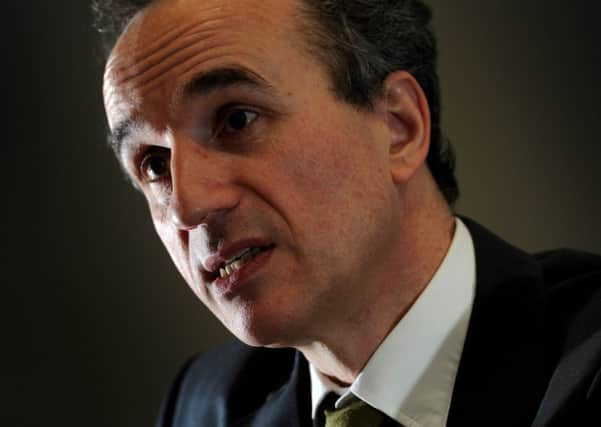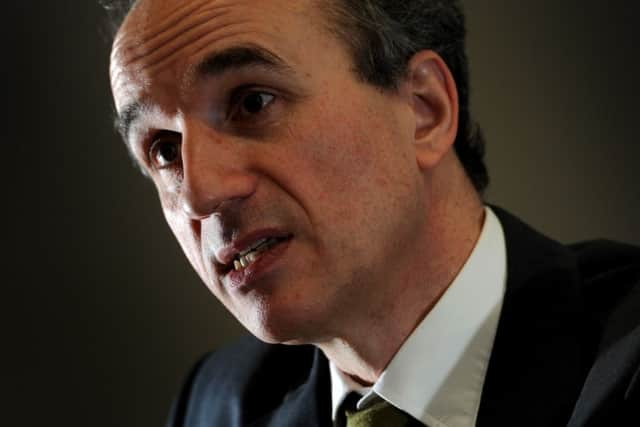Deloitte says economic recovery has ‘got legs’


Ian Stewart, chief economist at Deloitte, told the Yorkshire Post that lots of companies are gearing up to invest.
This will help make the recovery more sustainable, he said during a visit to the region yesterday.
Advertisement
Hide AdAdvertisement
Hide AdThe Office for National Statistics said the UK recorded its fastest annual growth since the financial crisis despite a slight slowdown in the last three months of the year.


Mr Stewart said he is also optimistic about productivity - output per person - improving.
Britain has lagged its international rivals in this key measure of competitiveness.
He said: “As output rises we will see productivity improve, profitability improve and capital spending improve. There is going to be a virtuous cycle.”
Advertisement
Hide AdAdvertisement
Hide AdRisk appetite among corporates, a major determinant of investment, is at its highest level in six years, said Mr Stewart.
Access to finance has improved, particularly for medium and large-sized companies, and the stock of equipment and machinery is worn out, strengthening the case for investment, he added.
Deloitte expects business investment to rise by six or seven per cent this year.
UK corporates are sitting on a cash pile equivalent to 35 per cent of GDP or more than £400bn, according to the Big Four accountancy firm.
Advertisement
Hide AdAdvertisement
Hide AdMr Stewart said British companies have been very successful in managing their businesses through a period of extraordinary weakness, by controlling costs and strengthening balance sheets, but they now face a different set of challenges by demonstrating that they can grow their businesses and find profitable opportunities.
Meanwhile, sharp declines in unemployment have fuelled speculation that the Bank of England will increase the cost of borrowing sooner rather than later. But Mr Stewart said the Bank will not be in a hurry to raise interest rates.
“They have got to be convinced the recovery is embedded and we will probably not see rises until the early part of 2015,” he added.
“But what we may see this year is the Bank of England doing something more surprising, which is trying to tighten terms for credit and general lending through its financial policy committee. This is a massive innovation in monetary policy.”
Advertisement
Hide AdAdvertisement
Hide AdThe recovery has been driven by consumer spending. This is a paradox given that consumers have seen declining outcomes, said Mr Stewart. They have been borrowing money to spend on housing and cars.
The recovery has been helped by compensation from mis-sold payment protection insurance.
Tom Vosa, chief economist at Yorkshire Bank, has described the £13bn PPI payouts as a “massive windfall tax” on the banking sector and “pure helicopter money”.
The ONS figures showed that services output for 2013 was up by 1.9 per cent, the same as the wider economy.
Advertisement
Hide AdAdvertisement
Hide AdIn contrast, manufacturing shrank by 0.1 per cent year-on-year. This was better than the 1.7 per cent decline in 2012 but the sector remains 8.2 per cent off its pre-crisis level. However, quarterly growth levels showed an accelerating improvement.
Mr Stewart met with manufacturers at Cutlers’ Hall in Sheffield on Monday night. He said that while the service sector will likely remain the big engine of growth in jobs, there are signs that manufacturing can be a dynamic, high value-added success story.
He said the largely foreign-owned UK car industry has been a phenomenal success and is starting to generate demand in the UK supply chain.
At a wider level, he acknowledged that the forces of globalisation and technology have had a huge effect on the structure of the economy and made industries and business models redundant although consumers have benefited by being able to buy more goods for less money.
Advertisement
Hide AdAdvertisement
Hide AdMr Stewart said: “Like all big shocks over history, technology and globalisation both destroy and create.
“The challenge for us is to help that process, to help the reallocation of resources from industries which are under pressure to those which are growing.
“The best way of doing that is by providing stability and an environment which is conducive to innovation and which rewards risk taking and ideas.”
Mr Stewart said he was encouraged by the level of new business formation in the UK.
Advertisement
Hide AdAdvertisement
Hide Ad“The threshold for developing new products and new businesses has declined because you can buy in so many services. You don’t need to do your own manufacturing or all the functions companies traditionally have done,” he said.